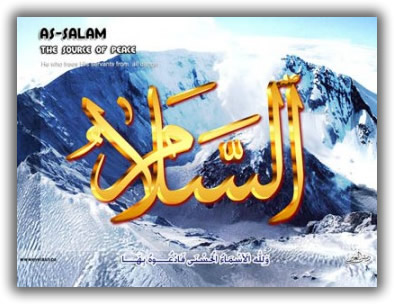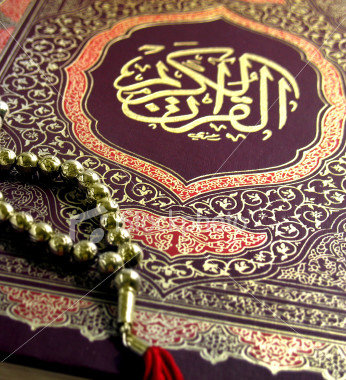Posts Tagged ‘Islamisation’
100,000 Germans march against anti-Islam protests
Posted by: KING-slave of ALLAH ! on: January 13, 2015
- In: Islam | Islam News | Miscellaneous | News
- 2 Comments
100,000 Germans march against anti-Islam protests

Germans March Against Anti-Islam Protest
The Best Days of this World
Posted by: KING-slave of ALLAH ! on: November 20, 2009
- In: All | Allah الله | Islam
- 1 Comment
The Best Days of this World

The Virtues of the first 10 days of Dhul Hijja:
1. Ahadith of the Prophet (s):
قال النبي –صلى الله عليه وسلم-( مامن أيام العمل الصالح فيها أحب إلى الله من هذه الأيام قالوا يا رسول الله : ولا الجهاد في سبيل الله قال ولا الجهاد في سبيل الله إلا رجل خرج بنفسه وماله فلم يرجع من ذلك بشئ) رواه البخاري
The Prophet (s) said: “There are no days in which good deeds are more beloved to Allah than during these days. The Sahaba said: Oh Rasul Allah, not even jihad in the path of Allah? He (s) said: Not even jihad in the path of Allah except for the man who goes out in the path of Allah with his life and his wealth and returns with neither of them.”
وقال ( أفضل أيام الدنيا أيام العشر) رواه البزار وصححه الالبانى.
And he (s) said: “The best days of this world are these ten.”
2. Allah swears by these 10 days in the Qur’an:
قول الله تعالى: ((وَالْفَجْرِ، وَلَيَالٍ عَشْرٍ)) سورة الفجر (1-2)، قال ابن كثير رحمه الله: المراد بها عشر ذي الحجة
Allah says: “By the dawn, and by the 10 nights” [Qur’an, 89:1-2]. Ibn ‘Abbas, Ibn al-Zubayr, Mujahid and others of the earlier and later generations said that this refers to the first ten days of Dhul Hijjah. Ibn Katheer said: “This is the correct opinion.”
قال تعالى: ((وَيَذْكُرُوا اسْمَ اللَّهِ فِي أَيَّامٍ مَّعْلُومَاتٍ)) سورة الحج(28)، قال ابن عباس: أيام العشر
Allah says: “…and mention the name of Allah on appointed days…” [Qur’an, 22:28] Ibn ‘Abbas said these are the ten days.
3. These ten days are better than Ramadan:
قال المحققون من أهل العلم: أيام عشر ذي الحجة أفضل الأيام، وليالي العشر الأواخر من رمضان أفضل الليالي.
Most scholars adopt the opinion that these days are better than the last ten days of Ramadan. However, what holds the last ten days of Ramadan at a higher status is the Night of Power (Laylat ul-Qadr) which is equivalent to one thousand months (83.33 years).
تضاعف فيها الحسنات قال ابن عباس”: العمل فيهن بسبعمائة ضعف”
The rewards are multiplied in these days. Ibn ‘Abbas said: “(The reward for good) deeds are multiplied seven hundred times in these days.”
قال الاوزاعى: “بلغني أن العمل في أيام العشر كقدر غزوة في سبيل الله يصام نهارها ويحرس ليلها إلا أن يختص امرء بشهادة”
Al Awzaa’i said: I was informed that good deeds during the ten days are the equivalent (in reward) to a battle in the path of Allah, in which the day is spent in fasting and the night in safeguarding, except if one is bestowed with martyrdom.”
In Ramadan doing good deeds and struggling in worship, especially during the last ten nights, is easier than during these days for a few reasons. Firstly, the atmosphere of the month of Ramadan, whether culturally, spiritually, or traditionally, makes it easier to focus and strive. Secondly, the shayateen are chained. So, to get that drive and direction we had in Ramadan, is much harder when we have most likely fallen out of “Ramadan mode.” However, since the `ibada is more difficult, the reward is greater. So let’s keep this in mind and get ready to really work hard.
The Plan of Action for these 10 days:
1. Really feel this blessing and realize that it is an opportunity of a lifetime, because none of us know if we will witness these 10 days again.
كان خالد بن معدان يقول( إذا فتح لأحدكم باب للخير فليسرع فاءنه لا يدرى متى يغلق عنه
Khalid bin Mi’dan used to say: “If the door for good is opened for one of you, then rush (to take advantage) because you don’t know when it will close.”
2. Have high aspirations in your worship and use the examples of the ijtihad of the saliheen as motivation.
3. Take advantage of the opportunities to get the reward of hajj while being elsewhere.
قال-صلى الله عليه وسلم-( من صلى الفجر في جماعة ثم قعد يذكر الله حتى تطلع الشمس ثم صلى ركعتين كانت له كأجر حجة وعمرة تامة تامة تامة
The Prophet (s) said: “Whoever prays fajr in congregation and then sits in remembrance of Allah until the sun rises, then prays two rak’aat, he has the full reward of hajj and `umrah.”
4. Perfecting the fara`idh (obligatory actions):
Often times we become busy trying to do extra deeds, but neglect the fact that perhaps maybe what is obligatory upon us is not at the level it should be. There is no way for a person to become close to Allah other than through the obligatory actions, as is apparent in the famous hadith qudsi in which Allah says: “My servant does not become closer to me by anything more beloved to me than what I have obligated upon him.”
Reasonable Goals:
1. Khatm of Qur’an: equivalent to more than half a million hasanaat during these days. Let’s try to complete the recitation of the Qur’an during these days, ending by ‘Asr time on the day of ‘Arafah and spending from ‘Asr to Magrhib in du’aa.
2. Qiyam al-Layl:
Rasulallah (s) said: “Whoever stands in prayer, reciting 1,000 verses is written among the muqantareen.” A qintar is equal to 70,000 dinar. The recitation of the last two ajzaa` of the Qur’an is equivalent to 1,000 verses.
3. Extra Salah during the day: The Prophet (s) said: “There is not a Muslim who prays twelve raka’at per day, other than the obligatory prayers, except that a palace is built for him in paradise.”
4. Dhikr: The best form of worship to do in these ten days as apparent in the hadith:
Ibn `Umar said that the Messenger of Allah (s) said, “There is no day more honorable in Allah ’s sight and no acts more beloved therein to Allah than those in these ten days. So say tahlil (There is no deity worthy of worship but Allah: La ilaha illAllah), takbir (Allah is the greatest: Allahu akbar) and tahmid (All praise is due to Allah: alhumdulillah) a lot.” [Ahmad, 7/224]
The Messenger of Allah, may Allah bless him and grant him peace, said, “The best du`a’ is du`a’ on the day of `Arafah, and the best thing that I or the Prophets before me have said is ‘There is no god but Allah, alone, without any partner’ (La ilaha illa’llah, wahdahu la sharika lah)” [Muwatta, Malik].
7. Reviving the Sunnah of Takbir:
Ibn `Umar and Abu Hurairah (ra) used to go out in the marketplace during the first ten days of Dhul-Hijjah, reciting takbeer, and the people would recite takbeer when they heard them.
8. Fasting:
The reward of fasting is great, so imagine how much that reward would be multiplied in these days. If one can’t fast all of the 9 days, then at least on the day of `Arafah as it is the greatest day.
Abu Qatadah reported that the Messenger of Allah (s) said, “Fasting on the day of ‘Arafah is an expiation for two years, the year preceding it and the year following it. Fasting the day of `Ashura is an expiation for the year preceding it.” [This is related by “the group,” except for al-Bukhari and at-Tirmidhi]
The Prophet (s) said “There is no day that Allah will free people more than the day of `Arafah.”
`Ali (ra) used to advise people to say “Oh Allah free my neck from the fire” on the day of `Arafah.
9. Du`a’:
Especially on the day of `Arafah, but also at anytime. Keep in mind the times where du’aa is more likely to be accepted and ask during those times.
* The last third of the night
* Between the adhaan and iqaamah
* During the rain
* In sujood
* Friday
* While fasting
10. Sadaqa (charity):
Give sadaqa during these days, since the reward is multiplied tremendously.
11. Tawba (asking for forgiveness):
Continually renew repentance.
12. Establish ikhlas in `ibada.
13. Check and renew intentions at all times
The Day of `Eid
On the greatest day, remained focused as it is still part of the first 10 days which are the best days of the year! Try not to get too caught up in celebrating that you stop doing the worship that you were doing the first 9 days.
The day of ‘Eid: a day for visiting family and performing the sacrifice for one who is able.
By Zahra
Whoever is the first to give another person the news :: FAKE HADITH
Posted by: KING-slave of ALLAH ! on: November 9, 2009
- In: All | Allah الله | Fake Hadith | Hoax-Email Forwards | Hoax-FB Messages | HOAX-Messages | Islam
- 10 Comments
The Prophet Sallallaahu alaihi wasallam has said, “Whoever is the first to give another person the news about the month of Rabi-ul-Awwal, the fire of hell is Haraam for them”. Is this Hadeeth authentic? If it is not, could you explain the warning for those who circulate fabricated Ahadeeth?
We have not come across a Hadeeth in which it is mentioned that the fire of Hell is Haraam upon the first person who gives the news about Rabi’ul Awwal.
If this Hadeeth is fabricated and was not mentioned by Rasulullah Sallallahu Alaihi Wasallam, the person who fabricated the Hadith as well as all those who convey the Hadeeth are deserving of the severe warning of Rasulullah Sallallahu Alaihi Wasallam. Rasulullah Sallallahu Alaihi Wasallam said, “To fabricate my words is not like fabricating any other person’s words. The person who fabricates my words should prepare an abode for himself in the fire of hell.” (Sahih al Bukhari, Hadith #: 1291).
Unfortunately, due to wide spread ignorance, e-mails containing false information and fabricated Ahadeeth are widely circulated. The creators of such e-mails as well as those who forward them to others should take heed of the severe warning of Rasulullah Sallallahu Alaihi Wasallam. It is therefore imperative that one exercises caution when one receives e-mails of such a nature wherein there is no authentic reference mentioned. Such e-mails or pieces of information should be referred to reliable and learned scholars for verification.
And Allah Ta’ala Knows Best.
Islamic Guidelines for Visitors to the Prophet’s Mosque
Posted by: KING-slave of ALLAH ! on: November 7, 2009
- In: All | Allah الله | Hadith/Sunnah | Mohammad | muhammad | Prophet Muhammad [pbuh]
- 4 Comments

Islamic Guidelines for Visitors to the Prophet’s Mosque
Praise be to Allaah.
 O you who come to the City of the Messenger of Allaah (peace and blessings of Allaah be upon him), you have come to a good place and you are going to earn great reward. May Allaah accept your righteous deeds and fulfil your greatest hopes. Welcome to the land of Hijrah and victory, the land of the Chosen Prophet, the land to which the righteous Sahaabah migrated and the home of the Ansaar.
O you who come to the City of the Messenger of Allaah (peace and blessings of Allaah be upon him), you have come to a good place and you are going to earn great reward. May Allaah accept your righteous deeds and fulfil your greatest hopes. Welcome to the land of Hijrah and victory, the land of the Chosen Prophet, the land to which the righteous Sahaabah migrated and the home of the Ansaar.
There follow a few words of advice to those who want to visit the Mosque of the Messenger of Allaah (peace and blessings of Allaah be upon him):
1 – O you who come to Madeenah, you are in a place which, after Makkah, is the best and noblest of all places, so respect it as it should be respected; honour its sanctity and holiness and observe the best etiquette therein.
Know that Allaah has warned of the severest punishment for those who commit evil therein. It was narrated from Abu Hurayrah (may Allaah be pleased with him) that the Prophet (peace and blessings of Allaah be upon him) said:
“Madeenah is a Haram (sanctuary), so whoever commits evil therein or gives protection to an evildoer, the curse of Allaah, the angels and all of mankind may be upon him. Allaah will not accept any obligatory or naafil deed from him on the Day of Resurrection.” Narrated by al-Bukhaari, 1867; Muslim, 1370.
So whoever commits any evil action or offers protection to any evildoer who seeks his help is exposing himself to a humiliating punishment and the wrath of the Lord of the Worlds.
One of the most serious of evil deeds that violate its purity is openly doing acts of bid’ah and spoiling its atmosphere with myths and false ideas, and contaminating its pure land with the spread of articles which promote bid’ah, books which contain shirk, and all kinds of reprehensible and haraam actions which go against Islamic sharee’ah. The evildoer and the one who gives him protection are equally guilty of sin.
2 – Visiting the Prophet’s Mosque is an act that is Sunnah; it is not an obligatory action and has nothing to do with Hajj, nor is it an action that is required in order for Hajj to be complete.
All the ahaadeeth which say that it is connected to Hajj or that say that visiting the grave of the Prophet (peace and blessings of Allaah be upon him) is connected to Hajj are fabricated and false. Whoever travels to Madeenah for the purpose of visiting the Mosque and praying therein, his intention is acceptable and his efforts will be rewarded. Whoever travels there only for the purpose of visiting the graves and seeking the help of their occupants, his intention is haraam and his actions are reprehensible.
It was narrated from Abu Hurayrah that the Messenger of Allaah (peace and blessings of Allaah be upon him) said:
“Do not travel to visit any mosques except three: al-Masjid al-Haraam [in Makkah], this Mosque of mine [in Madeenah] and al-Masjid al-Aqsa [in Jerusalem].” Narrated by al-Bukhaari, 1189; Muslim, 1397.
It was narrated from Jaabir (may Allaah be pleased with him) that the Messenger of Allaah (peace and blessings of Allaah be upon him) said:
“The best places to which a person may travel are this Mosque of mine, and the Ancient House (i.e., the Ka’bah).” Narrated by Ahmad, 3/350; classed as saheeh by al-Albaani in al-Silsilah al-Saheehah, 1648.
3 – Prayers offered in the Mosque of Madeenah bring a multiple reward, both obligatory and naafil prayers according to the more correct of the two scholarly opinions.
The Prophet (peace and blessings of Allaah be upon him) said:
“One prayer in this Mosque of mine is better than one thousand prayers offered anywhere else, except al-Masjid al-Haraam.” Narrated by al-Bukhaari, 1190; Muslim, 1394.
But offering naafil prayers at home is better than offering them in the mosque, even if the reward for offering them in the Mosque is multiplied, because the Prophet (peace and blessings of Allaah be upon him) said,
“The best prayers are those that a man offers in his home, apart from the prescribed [obligatory] prayers.” Narrated by al-Bukhaari, 731; Muslim, 781.
4 – The visitor to this great Mosque should note that it is not permissible to seek blessing (barakah) from any part of the Prophet’s Mosque, such as the pillars, walls, doors, mihraab or minbar, by touching or kissing them.
It is also not permitted to seek blessing from the Prophet’s hujrah (chamber) by touching it, kissing it, or wiping one’s clothes against it or to circumambulate it. Whoever does any of these things has to repent and not repeat it.
5 – It is prescribed for the one who visits the Prophet’s Mosque to pray two rak’ahs in the Rawdah or whatever he wants of naafil prayers, because it is proven that there is virtue in doing so.
It was narrated from Abu Hurayrah that the Prophet (peace and blessings of Allaah be upon him) said:
“The area between my house and my minbar is one of the gardens (riyaad, sing. rawdah) of Paradise, and my minbar is on my cistern (hawd)” Narrated by al-Bukhaari, 1196; Muslim, 1391.
And it was narrated that Yazeed ibn Abi ‘Ubayd said:
“I used to come with Salamah ibn al-Akwa’ and he would pray by the pillar which was by the mus-haf, i.e. in the Rawdah. I said, ‘O Abu Muslim, I see that you are keen to pray by this pillar!’ He said, ‘I saw that the Prophet (peace and blessings of Allaah be upon him) was keen to pray here.’” Narrated by al-Bukhaari, 502; Muslim, 509.
Being keen to pray in al-Rawdah does not justify being aggressive towards people or pushing the weak aside, or stepping over their necks.
6 – It is prescribed for the visitor to Madeenah and for the one who lives there to go to the Mosque of Quba’ and pray there, following the example of the Prophet (peace and blessings of Allaah be upon him) and seeking the reward of ‘Umrah.
It was narrated that Sahl ibn Haneef said: The Messenger of Allaah (peace and blessings of Allaah be upon him) said:
“Whoever goes out until he comes to this mosque – meaning the Mosque of Quba’ – and prays there, that will be equivalent to ‘Umrah.” Narrated by Ahmad, 3/437; al-Nasaa’i, 699; classed as saheeh by al-Albaani in Saheeh al-Targheeb, 1180, 1181.
According to Ibn Maajah:
“Whoever purifies himself in his house, then comes to the Mosque of Quba’ and prays there, he will have the reward of ‘Umrah.” Narrated by Ibn Maajah, 1412.
In al-Saheehayn it is narrated that the Messenger of Allaah (peace and blessings of Allaah be upon him) used to go to the mosque of Quba’ every Saturday, walking or riding, and he would pray two rak’ahs there. Narrated by al-Bukhaari, 1191; Muslim, 1399
7 – For the visitor to Madeenah, it is not prescribed to visit any other mosques in the city apart from these two, the Mosque of the Messenger of Allaah (peace and blessings of Allaah be upon him) and the Mosque of Quba’.
It is not prescribed for the visitor or anyone else to head for a particular spot, hoping for blessing or to worship Allaah in that place, when there is no evidence from the Qur’aan or Sunnah concerning visiting that place and no evidence that the Sahaabah (may Allaah be pleased with them) did that.
It is not prescribed to go to the places and mosques in which the Prophet (peace and blessings of Allaah be upon him) or the Sahaabah prayed in order to pray there or to worship Allaah by offering du’aa’s there etc., because the Prophet (peace and blessings of Allaah be upon him) did not enjoin that or encourage people to visit these places. It was narrated that al-Ma’roor ibn Suwayd (may Allaah have mercy on him) said:
We went out with ‘Umar ibn al-Khattaab, and we passed by a mosque on the way.
The people hastened to pray there, and ‘Umar said, “What is the matter with them?” They said, “This is a mosque in which the Messenger of Allaah (peace and blessings of Allaah be upon him) prayed.” ‘Umar said, “O people, those who came before you were doomed because they followed such practices, until they established places of worship in such locations. If a time for prayer comes when you are there, then pray, and if it is not the time for prayer, then move on.” Narrated by Ibn Abi Shaybah in al-Musannaf, 7550.
When ‘Umar ibn al-Khattaab heard that there were people who came to the tree under which the Prophet (peace and blessings of Allaah be upon him) had received the bay’ah (oath of allegiance), he ordered that it be cut down. Narrated by Ibn Abi Shaybah in al-Musannaf, 7545.
8 – It is prescribed for men who are visiting the Prophet’s Mosque to visit the grave of the Prophet (peace and blessings of Allaah be upon him) and the graves of his two companions Abu Bakr and ‘Umar (may Allaah be pleased with them), and to send salaams upon them and make du’aa’ for them.
But for women it is not permissible for them to visit graves according to the more correct of the two scholarly opinions, because of the hadeeth narrated by Abu Dawood (3236), al-Tirmidhi (3236) and Ibn Maajah (1575) from Ibn ‘Abbaas (may Allaah be pleased with him), according to which the Prophet (peace and blessings of Allaah be upon him) cursed the women who visit graves.
The way in which the grave of the Prophet (peace and blessings of Allaah be upon him) is to be visited is that the visitor should come to the grave and face it and say “Al-salaamu ‘alayka ya Rasool-Allaah (Peace be upon you, O Messenger of Allaah).” Then he should move about a yard to his right and say salaams to Abu Bakr by saying, “Al-salaamu ‘alayka ya Aba Bakr.” Then he should move a little further to his right, about a yard, and say salaams to ‘Umar ibn al-Khattaab, by saying, ‘Al-salaamu alayka ya ‘Umar.”
9 – It is prescribed for men who are visiting Madeenah to visit the people buried in Baqee’ al-Gharqad and the martyrs of Uhud, to send salaams on them and to make du’aa’ for them.
It was narrated that Buraydah (may Allaah be pleased with him) said:
The Messenger of Allaah (peace and blessings of Allaah be upon him) used to teach them, when they went out to the graveyards, to say, “Al-salaamu ‘alaykum ahl al-diyaar min al-mu’mineen wa’l-muslimeen, wa innaa in sha Allaah bikum laahiqoon. Nas’al Allaah lana wa lakum al-‘aafiyah. (Peace be upon you, O dwellers of these abodes, believers and Muslims. We will, when Allaah wills, join you. We ask Allaah to grant salvation to us and you).”
10 – Visiting the graves is prescribed for two great purposes:
(i) So that the visitor may receive a lesson and reminder.
(ii) So that the person visited will benefit from the du’aa’s and prayers for mercy and forgiveness that are offered for him.
Permission to visit graves is subject to the condition that no false words are spoken, the worst of which are shirk and kufr. It was narrated from Buraydah from his father that the Messenger of Allaah (peace and blessings of Allaah be upon him) said:
“I used to forbid you to visit graves, but now whoever wants to visit them let him do so, but do not utter any falsehood.” Narrated by al-Nasaa’i, 2033; classed as saheeh by al-Albaani in al-Silsilah al-Saheehah, 886.
Muslim narrated this also (no. 977), but without the phrase, “but do not utter any falsehood.”
It is not permitted to circumambulate these graves or any others, or to pray towards them or amongst them, or to perform acts of worship beside them such as reading Qur’aan, making du’aa’, etc, because these are means of associating others in worship with the Lord of all creation and taking them (graves) as places of worship , even if no mosque is built over them.
It was narrated that ‘Aa’ishah and ‘Abd-Allaah ibn ‘Abbaas (may Allaah be pleased with them both) said: When death was approaching the Messenger of Allaah (peace and blessings of Allaah be upon him), he put a cloak over his face, and when he felt hot he removed it and said,
“May Allaah’s curse be upon the Jews and Christians, for they took the graves of their Prophets as places of worship” – warning against doing what they did. Narrated by al-Bukhaari, 436; Muslim, 529.
And he (peace and blessings of Allaah be upon him) said:
“The most evil of people are those upon whom the Hour will come when they are still alive and those who take graves as places of worship.” Narrated by Ahmad, 1/405. It is also narrated by al-Bukhaari in a mu’allaq report in Kitaab al-Fitan, Baab Zuhoor al-Fitan, 7067. Also narrated by Muslim in Kitaab al-Fitan, Baab Qurb al-Saa’ah, 2949, without mentioning the taking of graves as places of worship.
It was narrated that Abu Marthad al-Ghanawi said:
I heard the Messenger of Allaah (peace and blessings of Allaah be upon him) say, “Do not sit on graves or pray facing towards them.” Narrated by Muslim, 972.
And it was narrated that Abu Sa’eed al-Khudri (may Allaah be pleased with him) said: The Messenger of Allaah (peace and blessings of Allaah be upon him) said,
“All of the earth is a place of prayer apart from graveyards and bathrooms.” Narrated by Ahmad, 3/83; al-Tirmidhi, 317; classed as saheeh by al-Albaani in Irwa’ al-Ghaleel, 1/320.
According to a hadeeth narrated by Anas (may Allaah be pleased with him, the Prophet (peace and blessings of Allaah be upon him) forbade people to pray between graves. Narrated by Ibn Maajah, 1698. Al-Haythami said in Majma’ al-Zawaa’id (2/27), Its men are the men of saheeh.
It is not permissible to prostrate on graves, rather that is a kind of idolatry and ignorance, and a sign of intellectual deviation and backwardness. It is not permissible for the visitor to those graves or anyone else to seek blessings from them by touching them, kissing them, clinging with any part of the body to them, or to seek healing from its dirt by rubbing one’s hands or face with it or to take anything from them in order to dilute it with water and wash oneself with it.
It is not permissible for visitors to the grave or others to bury any part of their hair or body or handkerchiefs in them, or to put their pictures or anything else that they may have with them in their soil in order to seek blessing (barakah).
It is not permissible to throw money or any kind of food such as grains etc. on them. Whoever does any of these things has to repent, and not do it again. It is not permissible to perfume them, or to swear to Allaah by their occupants. It is not permissible to ask of Allaah by virtue of their occupants or their status, rather that is a haraam kind of beseeching Allaah and is one of the means that lead to shirk. It is not allowed to build up the graves or erect any structure over them, because this is a means of veneration that leads to shirk. It is not permissible to sell food or perfume etc to one who it is known will use them for such seriously wrong actions.
Seeking the help of the dead or asking them for support or calling upon them and asking them to meet needs and to help alleviates calamity and to bring benefits and ward off hardships are all forms of major shirk which put a person beyond the pale of Islam and make him a worshipper of idols, because no one can relieve a person of worries and distress except Allaah alone with no partner or associate. Allaah says (interpretation of the meaning):
“Such is Allaah, your Lord; His is the kingdom. And those, whom you invoke or call upon instead of Him, own not even a Qitmeer (the thin membrane over the date stone).
If you invoke (or call upon) them, they hear not your call; and if (in case) they were to hear, they could not grant it (your request) to you. And on the Day of Resurrection, they will disown your worshipping them. And none can inform you (O Muhammad) like Him Who is the All‑Knower (of everything”
[Faatir 35:13-14]
“Say (O Muhammad): ‘Call upon those — besides Him whom you pretend [to be gods like angels, ‘Eesa (Jesus), ‘Uzayr (Ezra) and others]. They have neither the power to remove the adversity from you nor even to shift it from you to another person.’
Those whom they call upon [like ‘Eesa (Jesus) ‑ son of Maryam (Mary), ‘Uzayr (Ezra), angel and others] desire (for themselves) means of access to their Lord (Allaah), as to which of them should be the nearest; and they [‘Eesa (Jesus), ‘Uzayr (Ezra), angels and others] hope for His Mercy and fear His Torment. Verily, the Torment of your Lord is (something) to be afraid of!”
[al-Isra’ 17:56-57]
Written by Shaykh Salaah al-Budayr (Imam and Khateeb of the Prophet’s Mosque.)
![]()
![]()
![]()
The word ISLAM itself does not actually mean PEACE :: Miss-Conception ::
Posted by: KING-slave of ALLAH ! on: August 6, 2009
- In: All | Allah الله | Islam | MC-Islam | Miss-Conception
- Leave a Comment

Its a big misconception, that ISLAM=PEACE.
Islam is the Arabic word which literally means “submission to the will of Allah(God)” (the root of which is Silm and Salam).
Salaam is the Arabic word which means peace.
However, Peace is attained through submitting to the will of Allah, in obidience and sincerity.

![]()
![]()
![]()
Any Views on this….What you were believing ???
One who memorizes 40 (fourty) ahaadeeth is a weak hadeeth
Posted by: KING-slave of ALLAH ! on: August 6, 2009
- In: All | Allah الله | Fake Hadith | Islam
- 2 Comments

one who memorizes forty ahaadeeth is a weak hadeeth
Could you tell me if the ahadith about memorizing 40 of the Prophet (SAAS) sunnah and being admitted to paradise or raised with the scholars are authentic.
Praise be to Allaah.
1 – This hadeeth is da’eef (weak). Despite its large number of isnaads they do not support one another, and there are many different versions with different wordings, such as, “…Allaah will resurrect him on the Day of Resurrection among the fuqaha’ and scholars,” and “… Allaah will resurrect him a scholar and a faqeeh,” and “I will be an intercessor and a witness for him on the Day of Resurrection,” etc.
(a) al-Haafiz ibn Hajar said:
It was narrated by al-Hasan ibn Sufyaan in his Musnad and in his Arba’een, from the hadeeth of Ibn ‘Abbaas, and he narrated it from thirteen of the Sahaabah. It was narrated by Ibn al-Jawzi in al-‘Ilal al-Mutanaahiyah, and he explained that all of these ahaadeeth are da’eef. Ibn al-Mundhir discussed it in a separate volume, and I discussed it in the sixteenth chapter of al-Imla’. I mentioned all of its isnaads in one volume but there is not one isnaad that is free of faults.
Al-Talkhees al-Habeer, 3/93, 94.
(b) Ibn al-Mulaqqin said:
The hadeeth “Whoever preserves forty hadeeth for my ummah will be recorded as a faqeeh” was narrated via approximately twenty isnaads, all of which are da’eef (weak).
Al-Daaraqutni said: All its isnaads are da’eef and none of them are proven.
Al-Bayhaqi said: Its isnaads are weak.
Khalaasat al-Badr al-Muneer, 2/145
Al-Bayhaqi said:
This text is well known among the people but it has no saheeh isnaad.
Shu’ab al-Eemaan, 2/270
Al-Nawawi said:
The scholars of hadeeth are agreed that it is a weak hadeeth, although it has many narrations.
Muqaddimat al-Arba’een al-Nawawiyyah.
2 – We should note here that there are reports in the Sunnah which mention the virtue of listening to the hadeeth of the Prophet (peace and blessings of Allaah be upon him) and conveying it, even if it is just one hadeeth.
It was narrated that Zayd ibn Thaabit said: I heard the Messenger of Allaah (peace and blessings of Allaah be upon him) say,
“May Allaah bless a man who hears a hadeeth from us and memorizes it so that he can convey it to others, for perhaps he is conveying it to one who will understand it better than him, and perhaps the one who conveys knowledge does not understand it himself.”
(Narrated and classed as hasan by al-Tirmidhi, 2656; also narrated by Abu Dawood. 3660; Ibn Maajah, 230).
Al-Mubaarakfoori said:
What is meant is that Allaah has singled him out for happiness and joy because of the knowledge with which He has blessed him and the status among people in this world and blessings in the Hereafter that he attains thereby, so that the joy and blessings are seen on his face. And it was suggested that the hadeeth indicates what happens to the person of joy and blessing that appears on his face.
Tuhfat al-Ahwadhi, 7/347, 348
And Allaah knows best.
![]()
![]()
![]()









































 Oh Allah,Please Forgive me
Oh Allah,Please Forgive me Ex-Christians-Now Muslim,Alhamdulillah
Ex-Christians-Now Muslim,Alhamdulillah I Love My Prophet Muhammad s.a.w
I Love My Prophet Muhammad s.a.w
















![Fake Grave of Prophet Muhammad [pbuh]](https://islamgreatreligion.files.wordpress.com/2009/07/prophet_muhammad_pbuh_tomb4.jpg)


















Recent Comments